Libreria Antiquaria Pregliasco
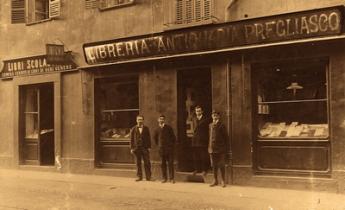
By Umberto Pregliasco
Part 1
"An insatiable passion possesses me, which even today I cannot and would not stop … I never grow tired of books. Perhaps I have more than necessary ... as they give us so many benefits, they don’t need any food or drink and they are satisfied with cast-off clothing and a place to lay their head”.
(Francesco Petrarca, 14th century)
We are rare book dealers and from the items we bought and sold over these decades, we had the opportunity to learn something about history, literature, art, life and the world (past and present). We realised that editing a text in English which should be read almost as an “historical tale” is a very hard job, something totally different from the usual bibliographic descriptions with our familiar technical terms. In any case, this pamphlet will be a much more comfortable way for you to share our history with us: let’s say that this text was guided by the same “Italian passion” that we have been putting in our works for a century...
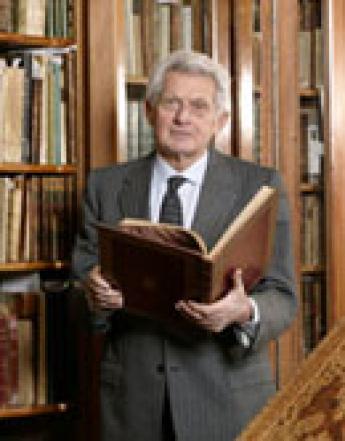
The Meaning of a Catalogue
“Nel suo profondo vidi che s’interna, legato con amore in un volume, ciò che per l’universo si squaderna”
“in that depth, saw in one volume bound with love, whatever the universe unfolds”
(Paradiso XXXIII, 86-87)
At the same time when Italy celebrates the 150th anniversary of the Italian Unification, the Libreria Pregliasco turns one hundred years old. Therefore Italy was merely fifty years old when young Lorenzo Pregliasco, born in 1894 in the Piedmontese Langa, asked his family to sell a farm house to be able to buy a dusty second-hand bookshop in the centre of Torino. After returning from World War I, in 1921, together with his brother, Secondo, he published catalogue no. 1, offering for sale four hundred books, among which the most expensive one was an illustrated incunabulum offered for 65 liras.
Since then we printed out about 300 publications, such as cyclostiled short-title lists, pamphlets for exhibitions, “Convivia” of various subjects and monographic catalogues. For this occasion we are presenting the “Catalogue 100” of the third series, one more reason to celebrate now one century of our activity. The custom for some antiquarian booksellers is to honour important events with catalogues limited to a few highly valuable books. On the other hand, we wanted to present a catalogue with the purpose of documenting the history of our activity under every aspect, as a bookshop moved by a passion that is beyond the financial aspect, aimed at bibliographical research, the conservation of books and manuscripts, and at the re-evaluation of what was not well known yet or has already been forgotten.
One of the bookseller’s duty is also to share culture, stimulating the book lover’s curiosity, offering books within every price range: throughout the chapters of this catalogue dealing with previously approached topics, and monographic catalogues, that followed one another through the years. we are also presenting, therefore, some volumes that assume their meaning when they are introduced side by side with the more expensive ones, dealing on the same subject. Once more we have decided to go through some of the aspects of the booksellers’ business along the 20th century, through the history of our bookshop, that is intended to guide the book lovers in the reading of this catalogue.
“When a writer dies, he embodies the books he has written”, Borges declared; paraphrasing this significant quotation, we could say that a rare-book dealer relives through the catalogues he has published. Very few memories might be left of the books that have been purchased and sold, while the collection of his own catalogues is the bookseller’s true spiritual last will, the story of his life and of how he was able “to sell his own soul”, transmitting with every sale his knowledge and passion to the bibliophiles.
A good book should leave you... slightly exhausted at the end. You live several lives while reading it.
(William Styron)
In his quite messy bookshop, Lorenzo used to receive visits from the cream of Turin intellectual elite: Benedetto Croce, Piero Gobetti, Franco Antonicelli and from a young man interested in political economics: Luigi Einaudi.
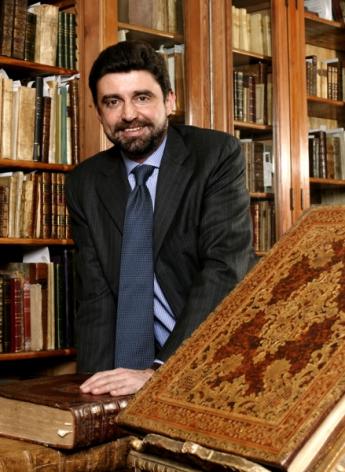
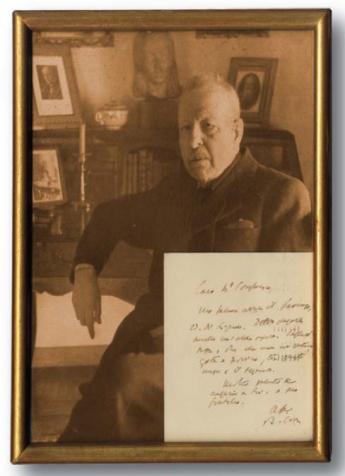
As Francesco Fadini wrote in his introduction to the Risorgimento catalogue of 1978: “Croce really liked the ‘ excellent Pregliasco’, recalled by his daughter, Donna Elena in her Ricordi familiari when in the Libreria he used to meet his friends: Einaudi, Gioele Solari, Francesco Ruffini, Domenico Bulferetti, Gobetti, Federico Patetta”. Einaudi, the future President of Italy used to confess: “I would rather buy, after years, on the rare-book market, and for 50 lira, the book that was sold out and that had become famous, which I would have bought new for 10 lira. So, I can save the money that I would have risked to spend on useless books”.
A great hunger for antique books drove the founder of the Bookshop throughout Italy – “travelling in the smoking section of the third class”, as he loved to remember – searching for libraries; his most important purchase is the one of the famous library put together by Francesco Melzi d’Eril, viceroy of Italy during Napoleon’s occupation.
And it was the dispersion of the Biblioteca Melziana, that in the period after the war gathered bibliophiles and book dealers from half-way around the world in the bookshop in Torino.
“Whoever has entered rooms which used to house volumes, maybe over the course of centuries, is aware of the feeling of holding ancient documents and books, and can imagine the emotion to give a new life to works that a long sleep has laid still for years. Through the bookseller’s search there will be a new stage of the mysterious route that the books follow in a time that is longer than the one allowed to their owners. Tracing the map of the trip is not possible, in some cases we are talking about hundreds of years that the book spends from library to library. It would be interesting to know where and from whom the volumes chosen by Melzi d’Eril had originated and where they have ended up. The Pregliasco family has been the means of a sudden return to life and, although it is obvious that a bookseller does not operate for this purpose, the result is fascinating and we cannot avoid recognizing the merit for a work that is not merely business.”.
Always read something that will make you look good if you die in the middle of it.
(P.J. O'Rourke)
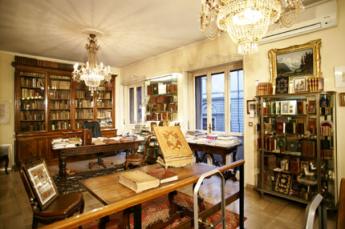
To be continued ...
Part 1 of "Living With - And From - Books: A Century of Manuscripts and Early Printed Books of Literature, Fine Arts, Science and First Editions", published by Umberto Pregliasco on the occasion of the 100th anniversary of the Libreria Antiquaria Pregliasco. The text is presented here by permission of the author.
>>> Libreria Antiquaria Pregliasco
>>> Celebrating one hundred years of Libreria Pregliasco - watch the video on Vimeo
